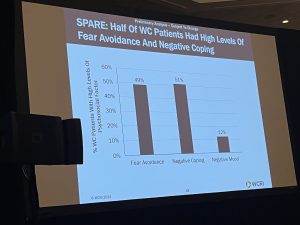Vennela Thumula PharmD and Randy Lea, MD doves into the presence and influence of psychosocial factors on recivery.
Dr Thumula led off by noting psychosocial barriers are the number one obstacle to recovery.
A variety of factors are barriers including:
- Poor recovery expectations, fear of pain
- Catastrophizing
- Perceived injustice
- Family system support issues, pre-ex psych factors
- Job dissatisfaction
Multiple guidelines recommend early identification of psychosocial risk factors. WCRI looked into prevalence of psychosocial factors in LPB patients seeking PT. do they recover differently
These factors were common, strongly associated with functional recoveries after PT care, and WC patient had more psycho risk factors and these facts were more strongly associated with functional outcomes.
Dr Thumula laid out the various screening tools used in the research and described the variation between WC and other payer types
Key takeaways:

- WC patients had high levels of fear avoidance and negative coping, both of which might impede return to work.
- Workers with higher levels of psychosocial risk factors (PF) had smaller functional improvements than those with lower levels.
- And, workers with elevated psychosocial risk factors were less likely to make meaningful improvements in function
- And, they had a much higher likelihood of “very limited” function at discharge from PT.
Dr Randy Lea summarized the findings and provided attendees with what they can tell colleagues upon return from the Conference.
- First, WCRI’s study is the most robust that focused on WC.
- Prevalence of PF was high – 1/3 to ½ were high risk.
- High risk factors result in 40% less improvement than workers without those factors.
So, stop, take a step back, and understand these are frequent, do occur, and are impactful.
Then, you may want to:
- refer the patient to a mental health professional, and/or
- make sure the treating clinician knows about the PF factors, and/or
- use the research to predict those who are most likely to benefit from care.


